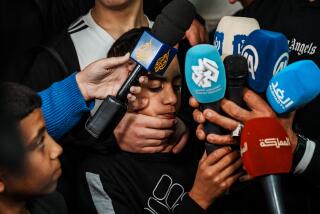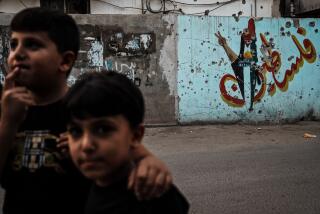Talk, not torture, gets the information
- Share via
He was only 12 years old, but he knew how to sling invective.
“You Americans are infidels, and you deserve to die.” A skinny kid with a black head of hair and soft brown eyes, Naji had been brought to the Iraqi prison where I worked as an interrogator after his parents were killed. They died when the suicide bombers they’d been hosting blew themselves up to avoid being arrested. But Naji didn’t yet know that he was an orphan, and he was furious at having been captured by the Americans.
Steve, one of a team of interrogators who worked for me, responded to the boy’s tirade politely.
“Don’t you think we’re all just people and we need to get along?” Steve asked, speaking through our interpreter, Biggie. Naji, who’s name I have changed to protect his identity, shook his head violently.
“No,” Biggie translated. “You’re all infidel pigs! I can’t wait until I’m old enough to cut your heads off!”
There is more than one approach to extracting information from a captive. Interrogators are often encouraged to use threats and intimidation -- and even harsher methods. But my small group of Air Force investigators, along with several military and civilian interrogators on my team, were committed to a different way. We believed that interrogation methods based on building a relationship and on intellectual engagement were far more effective than intimidation and coercion.
As I watched the interrogation from the monitoring room, Naji’s invective seemed almost funny coming from such a scrawny kid. But it was a sign of how thoroughly he had embraced the Al Qaeda propaganda he had heard at home. We had to hope he was not the face of Iraq’s future.
“Do you know who this is?” Steve asked, showing Naji a photo of Abu Musab Zarqawi, the leader of Al Qaeda in Iraq.
“Of course, that is Abu Musab Zarqawi. He is our hero.”
“Your hero?”
“Of course! When we play, the tallest, biggest kid gets to be Zarqawi.”
In response to Steve’s probing questions, Naji proudly explained that his father was grooming him to be a mujahedin and a future leader of Al Qaeda. He also said that his father took him to important meetings.
A veteran interrogator the night before had told us we “should show the little punk who’s in charge.” This was the attitude of many of the old guard, the interrogators who had been at Guantanamo Bay and in Afghanistan and Iraq early in the war, when the “gloves were off.” They mocked those of us who didn’t imitate their methods of interrogation, which were based on fear and control. There was tremendous peer pressure to follow in their footsteps and not appear soft on our enemies.
We ignored the pressure. We believed that, particularly with a child, interviewing rather than interrogation got better results. Steve had been trained in interviewing children, and he used those skills with Naji, gently stroking the child’s ego and noting that he must have been a very important boy to have attended meetings. Soon, Naji started rattling off places where meetings had taken place. He detailed who was at the gatherings, how many guns were stored at the houses, what was discussed and what plans were made. Naji talked because Steve was sympathetic and made him feel good.
From the information he provided, it was clear that Naji’s father had been a mid- to high-level Al Qaeda leader with connections throughout Yousifiya and Al Anbar province. By the time the interview ended after an hour, Steve had filled up pages in his notebook with detailed information about Naji’s father’s network.
Back in our office, Steve and I marveled at all the intelligence Naji had provided -- the names, the locations. He’d pinpointed the better part of Al Qaeda’s operations around Yousifiya. In the two weeks that followed, our soldiers put this information to good use and took out a significant portion of Al Qaeda’s suicide-bombing network in the area. For two weeks, violence dropped and many lives were saved.
During my time in Iraq, I personally conducted 300 interrogations and supervised more than 1,000. Naji was the most committed Al Qaeda member I met during that time. He and his father, who had clearly joined the group because they bought into the ideology, represented a very small percentage of the Sunni Iraqis. The overwhelming majority of Sunni Iraqis I interviewed joined for other reasons -- economic need, to meet tribal obligations or, most common of all, to get protection from Shiite militias.
I interviewed Naji twice during the week after his first interview. By the end of his stay with us, after we had coddled him, ensured his comfort and treated him with affection despite his contempt for us, he started to warm up. By the day before he left, his vituperative speech had disappeared completely.
Good interrogation is not an exercise in domination or control. It’s an opportunity for negotiation and compromise. It’s a common ground where the two sides in this war meet, and it’s a grand stage where words become giants, tears flow like rivers and emotions rage like wildfires. It is a forum in which we should always display America’s strengths -- cultural understanding, tolerance, compassion and intellect. But that’s not how all interrogators see their role.
According to a recent report from the bipartisan Senate Armed Services Committee, “The abuse of detainees in U.S. custody cannot be attributed to the actions of a ‘few bad apples’ acting on their own.” The effects of the policy that allowed torture to happen at Guantanamo Bay, the report concluded, spread to Iraq through the interrogators who had first been at Guantanamo. The preference for harsh interrogation techniques was extremely counterproductive and harmed our ability to obtain cooperation from Al Qaeda detainees. Even after the old guard interrogators were forced to play by the rules of the Geneva Convention, there was still plenty of leeway for interrogation methods based on fear and control. I believe their continued reliance on such techniques has severely hampered our ability to stop terrorist attacks against U.S. forces and Iraqi civilians.
We will win this war by being smarter, not harsher. For those who would accuse me of being too nice to our enemies, I encourage you to examine our success in hunting down Zarqawi and his network. The drop in suicide bombings in Iraq at two points in the spring and summer of 2006 was a direct result of our smarter interrogation methods.
I used to tell my team in Iraq: “The things that make you a good American are the things that will make you a good interrogator.” We must outlaw torture across every agency of our government, restore our adherence to the American principles passed down to us and, in doing so, better protect Americans from future terrorist attacks.
More to Read
Sign up for Essential California
The most important California stories and recommendations in your inbox every morning.
You may occasionally receive promotional content from the Los Angeles Times.













